In the dying light, alone next to the stream, the wind blows Cassandra’s hair into her face, and she adjusts the lamba she has tied inexpertly around her waist. She is hungry, and the village women are cooking rice in black cauldrons balanced over wood fires. But the rice won’t be ready for at least another hour. She is always hungry here, where the standard meal, three times a day, is cassava leaves boiled with salt and ladled over as much rice as you can eat. She can eat a lot of rice now, but she is never full. She knows this constant hunger is beginning to affect her, both mentally and physically. She started wearing a lamba about a month ago; the villagers think (rightly) it is because she is trying to fit in, but she also wears it because her clothes don’t stay on her body anymore. She wants water now, too, and the stream teases her with chimes of invitation. Once, about three weeks after she arrived here, she succumbed, drinking from the stream on a long hot day in the field. She has been fighting giardia ever since.
Cassandra has been to this canyon many times in the course of her work. One adolescent baobab stands behind her to the south, about two hundred meters from the entrance to the canyon. A more ancient specimen guards a constriction in the rock about a kilometer and a half in front of her, to the north, deep in the canyon. Of all the trees she’s studying, this further tree is the one she loves most. It’s huge, and very old, the branches of its canopy interlaced in organic filigree. Immediately behind it the walls of the canyon narrow, creating a gap barely big enough for her to squeeze past. The first time she went out to this tree, exploring the area she started to twist through the natural door. Jaomora yelled at her to stop, explaining that beyond the doorway lies the land of the ancestors, where it is taboo for anyone to enter without paying proper respects. It is a fady place.
From the gloaming she catches a flash of bright pink waving in the breeze. It’s one of her transect flags. Back home, before she got here, she studied satellite photos of the area and traced tentative transect lines. But when she arrived she found that conditions on the ground were more difficult than she anticipated. Jaomora helped her delineate a more realistic survey protocol, but she doesn’t know if her data will stand up to rigorous scrutiny back home. Back home. Her pink flag undulates and suddenly her lungs won’t inflate properly. In her storage unit back home she has a pair of pink pumps the exact color of the transect flag. She sometimes wears them with a white and pink sheath dress. She can taste the wine and hors d’ouvres of a cocktail party, hear the low music and murmuring voices. Other field biologists stand in awkward groups against the wall, complain how they hate these things, discuss gel electrophoresis. She glides through the room, smiling, laughing, charming the money men.
The transect flag is tied to a stunted Pachypodium rosulatum, a succulent whose name means “elephant’s foot†for its bulbous shape and dry gray skin. Elephants are not native to Madagascar, but it was white scientists who renamed all the trees here anyway. She imagines a ghost elephant growing up from the pachypodium, shimmering in the almost dark. She imagines it trumpeting, calling its herd, then trampling the villagers, the village, every sign of human presence until no one could tell that anyone ever lived here. Salt the earth, she thinks.
In the gloom of the canyon lit by the half-moon and the stippled Milky Way, Cassandra squats with the village women. When she sat down among them they opened a tiny space for her, neither accepting nor rejecting her presence. She is elbowed, jostled, shoved to the left and right as the women next to her fidget and gesticulate. They pour toka from a reused water bottle into tiny glasses, precious things belonging to the wife of the village elder, used only on special occasions. The alcohol goes down like gasoline, leaving an oily, nauseating aftertaste. The Big Dipper hangs upside down just above the horizon, pouring stardust out of its pan onto the lighted side of the world. The eyes of a nocturnal mouse lemur spark for an instant in a pachypodium on the other side of the canyon.
The bottle comes around to her again, and she drinks, passing it to the woman on her left. Most of the women are drunk. Cassandra touches her lips and nose—they are numb, and she is speaking loudly to no one in an incomprehensible mix of English, French and Malagasy. She realizes she is drunk, too. The women are gossiping among themselves, increasingly animated, until one stands up and challenges another, screaming in Malagasy too fast for Cassandra to follow. She stands up, takes a step back and away from the oncoming fracas. She can suffer them no longer—they are illiterate, married at fourteen, at thirty keeping a household of ten children and already old. They spend their days gossiping, squabbling, creating petty dramas to fill their otherwise empty lives. Taking advantage of the distraction, Cassandra slips away from the group to walk north, deeper into the canyon.
Well out of earshot, Cassandra hears the conversation among the women.
“Where is the vahaza?”
“She left.”
“It’s taboo.”
“The ancestors will take care of her.”
“The ancestors will be offended.”
“I’m not going after her.”
“Let her go.”
*




